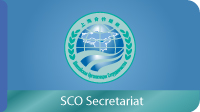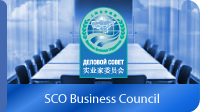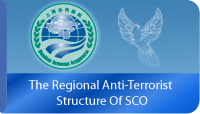|
|
 |
| The summit is over. Long live the summit! |
| 20.06.2011 10:00 |
|
|
|
|
Tatiana Sinitsyna, editor-in-chief, InfoSHOS
The SCO anniversary summit has become history. The year of Kazakhstan’s presidency in the organization, to which the country’s young capital, Astana, gave so much energy and imagination, is successfully over, leaving an impressive clot of power for the future. In compliance with the procedure, the relay baton of the SCO presidency was given over to Chinese President Hu Jintao, which means the next summit will take place in China.
Summit that did credit to Kazakhstan
The main outcome of the SCO summit in Astana was perhaps the confirmation that the international stage has a confident player that is growing stronger and that has to be counted with. A strong side of the SCO was still, as Nursultan Nazarbayev put it, “the balance of three aspects of its activities: security, economic, and cultural and humanitarian cooperation.”
Born in Shanghai as an act of political will, as a response to a threat to regional security, the SCO has reached out with its ideas and practical efforts to a huge territory of states that have been drawn into its orbit in the course of ten years. It successfully fit in the interior of global politics, gaining recognition from the United Nations. The Shanghai spirit, which symbolizes mutual trust, solidarity, equality, respect to cultural variety and willingness to develop together, makes the SCO a powerful center of gravity for all countries and nations that want an equal and mutually beneficial dialog.
Any organization where both Asian and European countries are represented tends towards the “Asian path.” This is a delicate way of reaching consensus through long talks. Renowned orientalist and political scientist Alexei Maslov says that “a major reason for this is the fact that the dignity of Asian countries has received blows throughout history, so they are especially fastidious about respect, parity and consensus.” There is no doubt that the set of these imperatives is attractive for everyone, and the SCO, which has made them into its fundamental principles, is demonstrating a new model of international cooperation.
So, if there is no consensus, a decision is not made. The formula is not easy, it is not mastered mechanically and, of course, the Shanghai Six had and still have something to work on. China, for example, has problems with getting rid of its mentality of an Asian super power. Many political scientists agree that Beijing sees the SCO as, among other things, an organization to legitimize its decisions. China is not the only one to have all kinds of ambitions, and the SCO’s goal is to teach all participants of the process to work on equal terms. The organization’s ten-year history and the obvious progress it has made testify to the fact that it manages to maintain the atmosphere of the “Shanghai spirit.”
SCO member states together sum up, analyze and adjust the developments of each year of the organization’s life when preparing for the summits and record the results at the meetings of their leaders. The place of summits, in compliance with the announced principle of parity, changes from year to year, with meetings travelling around capitals and other cities within the territory of the Shanghai Six. During the tenth year of its existence, the SCO was presided over by Kazakhstan, so the anniversary summit took place in Astana, which “did credit to Kazakhstan,” as Nursultan Nazarbayev put it.
Overall, summits are boring events for journalists because the result is almost always known beforehand, because the agenda is detailed in advance at different levels and mass media don’t miss it, of course. Little unexpected can happen at a summit. And thank God for that! One cannot think differently recalling the sad “surprise” of last year’s SCO summit in Tashkent, when the perfectly organized, successful meeting, on which Uzbekistan had worked a lot, was marred by the cruel ethnic conflict in the south of Kyrgyzstan.
SCO’s evolution
In his speech at the summit, Nazarbayev said that “having come a long way from Shanghai to Astana, the SCO has turned into a unique institution of international relations, uniting the most promising economies, states that represent different cultures and civilizations.” The Kazakh president cited the following facts: over the course of the years, trade turnover within the SCO grew sevenfold, the parties created a strategic foundation for expanding their economic cooperation and integration. They founded such structures as the Business Council and the Interbank Association and regularly hold the SCO Economic Forum. They adopted the Shanghai Convention on Counteraction to Terrorism, Separatism and Extremism. The efforts of the SCO Regional Anti-Terrorist Structure prevented over 500 terrorist attacks.
The economic component of cooperation is less successful (it is more difficult to find mutual interests in the non-bonded environment of partners that have different economic and resource potentials and also different political and mental approaches). Nevertheless, the organization is coming up with initiatives and looking for ways to implement joint projects; these efforts are bound to produce a result.
Nazarbayev proposed setting up a new structure within the SCO that would resolve problems of food security. He also called for building a single energy system within the organization. Yet another initiative is to introduce the notion of “national electronic border” to international law. He described “network destruction” as yet another common threat, the fifth one after terrorism, separatism, extremism and drug trafficking.
…And then there was the final chord of the summit, the closing remarks of the host. In the exquisite interior of the Palace of Independence, Nazarbayev told the gathering that “the meeting of SCO heads of state was held in the traditional atmosphere of trust and mutual understanding; they have summed up the results of the organization’s ten-year activities and determined the prospects of its development.”
The Shanghai Cooperation Organization has confidently passed the stage of initialization, establishment and formation of cooperation mechanisms, having become an important factor in ensuring regional security, stability and development of multi-vector cooperation, the Kazakh leader said. “The SCO approached its tenth anniversary as a dynamically developing and influential international organization,” he said. “Its strong side is and will be the balance of three components of its activities: security, economic, and cultural and humanitarian cooperation.”
Overall, the anniversary summit of SCO heads of state in Astana definitely marked a milestone in the organization’s evolution. The results of the meeting were recorded in documents. What is their essence? The key document, the Astana 10th anniversary declaration, summed up what had been done and outlined development targets for the future. It also expressed the SCO’s views on international problems.
In the declaration, the leaders of Russia, China, Kazakhstan, Kyrgyzstan, Tajikistan and Uzbekistan spoke against unilateral and unlimited expansion of missile-defense systems by one state or a small group of states. The Shanghai Six also expressed concern due to the instability in North Africa and in the Middle East.
The parties adopted the Anti-drug Strategy for 2011-2016 and the memorandum of interaction between the SCO and the UN Office for Drugs and Crime. These documents seek to intensify interaction to counteract illegal production, trafficking and transit of narcotic drugs, psychotropic substances and their precursors.
Yet another remarkable document is the Memorandum of obligations of a candidate country applying for SCO membership status. It sets criteria for countries that want to join the organization, explains the mechanism of joining international agreements, the financial aspects of SCO accession and other issues.
On the backstage of the summit, a lot was said about the importance of Afghanistan joining the SCO as an observer. Experts are positive that it may improve the situation in the country and help it to find a way out of the crisis. There was also a discussion why India and Pakistan, which are willing to move from the status of an observer to full membership, cannot be admitted to the SCO immediately (earlier, Tehran was told that as long as international organizations had complaints, it could not become a full SCO member). The issue of the SCO’s expansion is very delicate and it has numerous aspects. As to India and Pakistan, their bilateral territorial disputes were cited as the main reason preventing their accession. On the other hand, the participation of these two heavyweights in the SCO process as observers provides them with an additional incentive to improve their relations.
Having started with the topic of regional security (which still remains a top priority), the SCO has moved towards new projects of interaction. A new initiative voiced at the summit was concerned with sanitary cooperation. SCO healthcare ministers have already signed the Agreement on Cooperation in Healthcare. This provides an incentive for setting up expert groups to work in the new area of cooperation.
The meeting’s participants spoke in favor of further increasing the role of the SCO in regional and global politics and of intensifying cooperation with the organization’s observers and dialog partners. The reached agreements and adopted documents aim at contributing to the SCO’s development as an important component of the international security system and an efficient mechanism of varied regional cooperation.
The final chord was giving over the relay baton of SCO presidency to Chinese leader Hu Jintao, in compliance with the SCO procedures. The year of China’s presidency in the SCO has been declared the Year of Good Neighborliness and Friendship.
The summit was over, but there were aftermaths. In the lobby, journalists surrounded the Russian president’s aide Sergei Prikhodko. He gave a high assessment to the summit and then commented on the “situation with the Renminbi,” which worried many people. The thing is that both Nursultan Nazarbayev and Hu Jintao had spoken about new huge loans provided in the Chinese currency. The use of the Renminbi is growing, and journalists wondered if there was a treat to the Russian economy in it.
“We definitely don’t see this situation as a threat to our economic interests,” Prikhodko said. “If our Chinese partners can show more flexibility within the SCO, we understand and support them. In this case, we see China not as a rival, but, rather, as the initiator of a useful and very important process.”
After summit
Participants of the SCO summit were leaving – for Beijing, Delhi, Tehran or Tashkent… I left the cozy King Hotel at 4 a.m. to catch an early flight to Moscow. I went on a small comfortable bus, driven by a middle-aged man, amicable, sensible and lyrical. He spoke with love about the city, about the permanent winds in this area, about golden eagles, horses, sheep and camels, about how not everyone was able to feel the magic of the steppe, which, however, had its own fascinating mysteries. And he was so worried about the young forest planted around Astana – about 50,000 hectares. The trees were growing well, but would they survive once their roots reached salty soil? We agreed that experts were working on the issue and that it should turn out fine.
The heavy reddish moon looked down at us from the dark-blue predawn sky, shining down on Astana, this sleeping beauty of a Eurasian city. Our route went across the entire city, from the right bank to the left, from the old part to the new one, which has transformed magically over the past ten years. The urban fantasies of Japanese architect Kisho Kurokawa, the ideas of architects from Germany, Britain, Bulgaria and Switzerland, implemented by Chinese, Korean and Turkish builders, will leave no one indifferent, because they border on a miracle.
We crossed the Yesil and the driver told me that not long ago, this area had been covered by swamps, with rustling reeds and roaming boars. Swamps were dug out and brought away; in their place, new soil was laid, on which all these buildings were erected (they apparently included even the Palace of Independence, where the SCO meeting took place). This was a living image of a beautiful brave city, young and ambitious, which invoked admiration and respect.
…The plane went up as a huge silvery eagle, headed towards Moscow. From the window, I could see the fiery sun rising above the Great Kazakh steppe.
|
|
* Реестр иностранных средств массовой информации, выполняющих функции иностранного агента:
Голос Америки, Idel.Реалии, Кавказ.Реалии, Крым.Реалии, Телеканал Настоящее Время, Azatliq Radiosi, PCE/PC, Сибирь.Реалии, Фактограф, Север.Реалии, Радио Свобода, MEDIUM-ORIENT, Пономарев Лев Александрович, Савицкая Людмила Алексеевна, Маркелов Сергей Евгеньевич, Камалягин Денис Николаевич, Апахончич Дарья Александровна, Medusa Project, Первое антикоррупционное СМИ, VTimes.io, Баданин Роман Сергеевич, Гликин Максим Александрович, Маняхин Петр Борисович, Ярош Юлия Петровна, Чуракова Ольга Владимировна, Железнова Мария Михайловна, Лукьянова Юлия Сергеевна, Маетная Елизавета Витальевна, The Insider SIA, Рубин Михаил Аркадьевич, Гройсман Софья Романовна, Рождественский Илья Дмитриевич, Апухтина Юлия Владимировна, Постернак Алексей Евгеньевич, Общество с ограниченной ответственностью Телеканал Дождь, Петров Степан Юрьевич, Istories fonds, Шмагун Олеся Валентиновна, Мароховская Алеся Алексеевна, Долинина Ирина Николаевна, Шлейнов Роман Юрьевич, Анин Роман Александрович, Великовский Дмитрий Александрович, Альтаир 2021, Ромашки монолит, Главный редактор 2021, Вега 2021
* Сведения реестра НКО, выполняющих функции иностранного агента:
Фонд защиты прав граждан Штаб, Институт права и публичной политики, Лаборатория социальных наук, Фонд по борьбе с коррупцией, Альянс врачей, НАСИЛИЮ.НЕТ, Мы против СПИДа, Фонд защиты прав граждан, СВЕЧА, Гуманитарное действие, Открытый Петербург, Феникс ПЛЮС, Лига Избирателей, Правовая инициатива, Гражданская инициатива против экологической преступности, Фонд борьбы с коррупцией, Гражданский Союз, Российский Красный Крест, Центр Хасдей Ерушалаим, Центр поддержки и содействия развитию средств массовой информации, Горячая Линия, В защиту прав заключенных, Институт глобализации и социальных движений, Центр социально-информационных инициатив Действие, ВМЕСТЕ, Благотворительный фонд охраны здоровья и защиты прав граждан, Благотворительный фонд помощи осужденным и их семьям, Фонд Тольятти, Новое время, Серебряная тайга, Так-Так-Так, центр Сова, центр Анна, Проект Апрель, Самарская губерния, Эра здоровья, правозащитное общество Мемориал, Аналитический Центр Юрия Левады, Издательство Парк Гагарина, Фонд имени Андрея Рылькова, Сфера, Центр защиты СИБАЛЬТ, Уральская правозащитная группа, Женщины Евразии, Рязанский Мемориал, Екатеринбургское общество МЕМОРИАЛ, Институт прав человека, Фонд защиты гласности, Российский исследовательский центр по правам человека, Дальневосточный центр развития гражданских инициатив и социального партнерства, Пермский региональный правозащитный центр, Гражданское действие, Центр независимых социологических исследований, Сутяжник, АКАДЕМИЯ ПО ПРАВАМ ЧЕЛОВЕКА, Частное учреждение Совета Министров северных стран, Центр развития некоммерческих организаций, Гражданское содействие, Центр Трансперенси Интернешнл-Р, Центр Защиты Прав Средств Массовой Информации, Институт развития прессы - Сибирь, Фонд поддержки свободы прессы, Гражданский контроль, Человек и Закон, Общественная комиссия по сохранению наследия академика Сахарова, Информационное агентство МЕМО. РУ, Институт региональной прессы, Институт Развития Свободы Информации, Экозащита!-Женсовет, Общественный вердикт, Евразийская антимонопольная ассоциация, Чанышева Лилия Айратовна, Сидорович Ольга Борисовна, Таранова Юлия Николаевна, Туровский Александр Алексеевич, Васильева Анастасия Евгеньевна, Ривина Анна Валерьевна, Бурдина Юлия Владимировна, Бойко Анатолий Николаевич, Гусева Ольга Андреевна, Дугин Сергей Георгиевич, Пивоваров Андрей Сергеевич, Писемский Евгений Александрович, Аверин Виталий Евгеньевич, Барахоев Магомед Бекханович, Шевченко Дмитрий Александрович, Жданов Иван Юрьевич, Рубанов Роман Викторович, Шарипков Олег Викторович, Мальсагов Муса Асланович, Мошель Ирина Ароновна, Шведов Григорий Сергеевич, Пономарев Лев Александрович, Каргалицкий Борис Юльевич, Созаев Валерий Валерьевич, Исакова Ирина Александровна, Исламов Тимур Рифгатович, Романова Ольга Евгеньевна, Щаров Сергей Алексадрович, Цирульников Борис Альбертович, Халидова Марина Владимировна, Людевиг Марина Зариевна, Федотова Галина Анатольевна, Паутов Юрий Анатольевич, Верховский Александр Маркович, Пислакова-Паркер Марина Петровна, Кочеткова Татьяна Владимировна, Чуркина Наталья Валерьевна, Акимова Татьяна Николаевна, Золотарева Екатерина Александровна, Рачинский Ян Збигневич, Жемкова Елена Борисовна, Гудков Лев Дмитриевич, Илларионова Юлия Юрьевна, Саранг Анна Васильевна, Захарова Светлана Сергеевна, Аверин Владимир Анатольевич, Щур Татьяна Михайловна, Щур Николай Алексеевич, Блинушов Андрей Юрьевич, Мосин Алексей Геннадьевич, Гефтер Валентин Михайлович, Симонов Алексей Кириллович, Флиге Ирина Анатольевна, Мельникова Валентина Дмитриевна, Вититинова Елена Владимировна, Баженова Светлана Куприяновна, Исаев Сергей Владимирович, Максимов Сергей Владимирович, Беляев Сергей Иванович, Голубева Елена Николаевна, Ганнушкина Светлана Алексеевна, Закс Елена Владимировна, Буртина Елена Юрьевна, Гендель Людмила Залмановна, Кокорина Екатерина Алексеевна, Шуманов Илья Вячеславович, Арапова Галина Юрьевна, Пастухова Анна Яковлевна, Прохоров Вадим Юрьевич, Шахова Елена Владимировна, Подузов Сергей Васильевич, Протасова Ирина Вячеславовна, Литинский Леонид Борисович, Лукашевский Сергей Маркович, Бахмин Вячеслав Иванович, Шабад Анатолий Ефимович, Сухих Дарья Николаевна, Орлов Олег Петрович, Добровольская Анна Дмитриевна, Королева Александра Евгеньевна, Смирнов Владимир Александрович, Вицин Сергей Ефимович, Золотухин Борис Андреевич, Левинсон Лев Семенович, Локшина Татьяна Иосифовна, Орлов Олег Петрович, Полякова Мара Федоровна, Резник Генри Маркович, Захаров Герман Константинович
* Единый федеральный список организаций, в том числе иностранных и международных организаций, признанных в соответствии с законодательством Российской Федерации террористическими:
Высший военный Маджлисуль Шура, Конгресс народов Ичкерии и Дагестана, Аль-Каида, Асбат аль-Ансар, Священная война, Исламская группа, Братья-мусульмане, Партия исламского освобождения, Лашкар-И-Тайба, Исламская группа, Движение Талибан, Исламская партия Туркестана, Общество социальных реформ, Общество возрождения исламского наследия, Дом двух святых, Джунд аш-Шам, Исламский джихад, Аль-Каида, Имарат Кавказ, АБТО, Правый сектор, Исламское государство, Джабха аль-Нусра ли-Ахль аш-Шам, Народное ополчение имени К. Минина и Д. Пожарского, Аджр от Аллаха Субхану уа Тагьаля SHAM, АУМ Синрике, Муджахеды джамаата Ат-Тавхида Валь-Джихад, Чистопольский Джамаат, Рохнамо ба суи давлати исломи, Террористическое сообщество Сеть, Катиба Таухид валь-Джихад, Хайят Тахрир аш-Шам, Ахлю Сунна Валь Джамаа
* Перечень общественных объединений и религиозных организаций в отношении которых судом принято вступившее в законную силу решение о ликвидации или запрете деятельности:
Национал-большевистская партия, ВЕК РА, Рада земли Кубанской Духовно Родовой Державы Русь, Асгардская Славянская Община Асгардской Веси Беловодья, Славянская Община Капища Веды Перуна, Мужская Духовная Семинария Староверов-Инглингов, Нурджулар, К Богодержавию, Таблиги Джамаат, Русское национальное единство, Национал-социалистическое общество, Джамаат мувахидов, Объединенный Вилайат Кабарды, Балкарии и Карачая, Союз славян, Ат-Такфир Валь-Хиджра, Пит Буль, Национал-социалистическая рабочая партия России, Славянский союз, Формат-18, Благородный Орден Дьявола, Армия воли народа, Национальная Социалистическая Инициатива города Череповца, Духовно-Родовая Держава Русь, Русское национальное единство, Древнерусской Инглистической церкви Православных Староверов-Инглингов, Русский общенациональный союз, Движение против нелегальной иммиграции, Кровь и Честь, О свободе совести и о религиозных объединениях, Омская организация Русское национальное единство, Северное Братство, Клуб Болельщиков Футбольного Клуба Динамо, Файзрахманисты, Мусульманская религиозная организация п. Боровский, Община Коренного Русского народа Щелковского района, Правый сектор, Украинская национальная ассамблея, Украинская повстанческая армия, Тризуб им. Степана Бандеры, Украинская организация «Братство», Свидетели Иеговы, О противодействии экстремистской деятельности, РЕВТАТПОД, Артподготовка, Штольц, В честь иконы Божией Матери Державная, Сектор 16, Независимость, Организация футбольных болельщиков «Фирма», Молодежная правозащитная группа МПГ, Курсом Правды и Единения, Каракольская инициативная группа, Автоград Крю, Союз Славянских Сил Руси, Алля-Аят, Благотворительный пансионат Ак Умут, Русская республика Русь, Арестантское уголовное единство, Башкорт, Нация и свобода, W.H.С., Фалунь Дафа, Иртыш Ultras, Русский Патриотический клуб-Новокузнецк/РПК, Сибирский державный союз, Фонд борьбы с коррупцией, Фонд защиты прав граждан, Штабы Навального
|






















Leave a comment